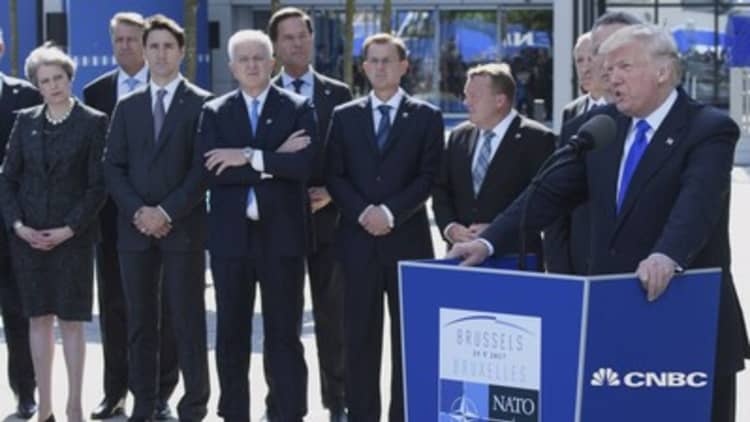The European Union is set to unveil proposals Wednesday for a new European defense union, and analysts believe that it won't affect funding for NATO and wouldn't complicate President Donald Trump's call for increased contributions from European nations.
Since the U.K.'s Brexit decision, the European Union has intensified talks on how to move forward and tackle the growing anti-EU feeling. In a white paper last March, the EU outlined several options for its future, four out of five included stronger defense integration.
"EU progress on this front in recent months has focused on establishing an EU defense fund and aiming to centralize procurement strategy. A possible future defense union would go further – it could necessitate a joint, centralized defense industrial strategy, sharing of member state 'strategic' defense assets, and perhaps even a level of autonomy from NATO," Aarti Shankar, political analyst at Open Europe, told CNBC via email.
European member states have been criticized by Trump for not respecting financial targets to NATO's budget.

At a leaders' summit at the end of May, Trump said 23 out of 28 members were being unfair towards U.S. taxpayers.
"Over the last eight years, the United States spent more on defense than all NATO countries combined. If all NATO members had spent just 2 percent of GDP on defense last year, we would have had another $119 billion for our collective defense," Trump said.
The defense union proposal could include a common European Counter-terrorism Agency, for example, to improve cooperation between police and judicial authorities on terrorism-related issues. It could also include a common fund to spend on defense. But, it is not yet known how much funding the troubled euro economies would have to spare to support a European defense union.
"It is highly unlikely that there would be fewer funds available to NATO. NATO does not have its own forces, it is 'merely' a structure to integrate and coordinate national forces," Daniel Gros, director of the Brussels-based think tank CEPS, told CNBC via email.
"It is also highly unlikely that any EU defense union structure would not be the disposal of NATO should they be needed either for the defense of Europe, or for missions somewhere else in the world," he added.
As a result, Europe's defense union might just avert any collapse with Trump's strategy.
Contributions to NATO have been a controversial issue between the US and its NATO allies.
Jens Stoltenberg, secretary general of NATO, has supported Trump's comments that members need to respect the 2 percent of GDP commitment. However, he has also supported the idea of a European defense union as long as it does not compete with NATO.
"I would like to once again underline that stronger European defense is something I welcome," Stoltenberg told European lawmakers a few weeks ago.
"As long as we make sure or the European Union makes sure that what the EU does is complementary to NATO, not competing with NATO," he pointed out.
Stoltenberg added that European leaders have told him that "strengthening European defense is about more defense spending, it's about more exercises, it's about developing new capabilities, it's about more cooperation, but it's not about establishing a European army, it's not about establishing new command structures which are duplicating NATO command structures."
European federalists, however, dream of a European army. The controversial German finance minister has been a long supporter of such initiative. However, in the face of growing anti-EU sentiment, even Wolfgang Schaeuble has suggested recently that European integration will have to take place at a slower pace.


